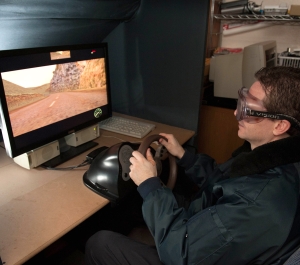
A Key Component of Psychology
Our students are actively involved in research. Every year, students publish papers in refereed journals, present at regional and national conferences, and participate in the Student Research and Creativity Conference. This kind of activity helps our students learn to think critically about psychology, learn about the research process, and prepare for careers and graduate school.

Faculty Supervised Research Teams
With a faculty member, students with similar interests form a team to study a particular research area. This is a great option for students just starting out who are not yet ready to tackle a project of their own.

Honors Thesis
The department responds to the needs of our high-achievement students with an "Honors Thesis" track in psychology. This two-semester experience is part of our Honors Degree Program. The first semester (PSY 496) is devoted to developing a research proposal, while the second semester (PSY 498) focuses on conducting and writing up the research. The student's work is directly supervised by a faculty mentor and must receive the approval of an Honors Thesis Committee consisting of psychology faculty. Recruitment of students to the Honors Thesis is selective and students must have met the requirements of the Honors Program to be considered.

PSY 499 (Independent Study) and PSY 495 (Independent Project)
Students interested in research (and graduate school!) are encouraged to complete an independent study or project. These experiences allow students to design and conduct a one-semester project under the supervision of a faculty member. Experiences are designed to match faculty and student interests. Students should see their advisers for more details. Prior to registration and in conjunction with the faculty supervisor, students must complete a departmental contract for both 499 and 495.

Psychology Club Research Team
Every year, the Psychology Club sponsors a group project. This is open to everyone and is a fun and stress-less first experience with research. For more information, see the Psychology Club advisers or one of the officers.
Adviser: Dr. Naseralla
Publications and Presentations
Publications with Student Co-authors
McKay, N.J., Horvatits, E.*, Jean, M.*, Doyle, J.*, Harrington, M.*, Amir, U.S.*, Carr, K.A. (2024). An acute social stressor decreases reinforcing value of both high and low energy-dense food in college students in a randomized controlled trial. Physiology and Behavior, 279, 114531.
VanRoo, C.*, Norvilitis, J. M., Reid, H. M., & O’Quin, K. (2023). The new normal: Amotivation, sense of purpose, and associated factors among college students during the COVID-19 pandemic. Psychological Reports. Online ahead of print. DOI: 10.1177/00332941231181485
McKay, N.J., Giorgianni, N.R.*, Czajka, K.E.*, Brzyski, M.G.*, Lewandowski, C.L.*, Hales, M.L.*, Sequeira, I.K.*, Bernardo, M.B., & Mietlicki-Baase, E.G. (2021). Plasma levels of ghrelin and GLP-1, but not leptin or amylin, respond to a psychosocial stressor in women and men. Hormones and Behavior, 134, 105017-105017.
Burke, G.,* & Norvilitis, J. M. (2020). The relationships between cyberbullying, sexting, and college student well-being. International Journal of Cyber Behavior, Psychology and Learning (IJCBPL), 10 (4), 34-50. doi:10.4018/IJCBPL.2020100103
Janikowski, L. I.,* & Norvilitis, J. M. (2020). Parental perceptions of children with and without learning disabilities. Modern Psychological Studies, 25 (1), article 11. Available at: https://scholar.utc.edu/mps/vol25/iss1/11 [Undergraduate journal]
Darlow, V.*, Norvilitis, J. M., & Schuetze, P. (2017). The relationship between helicopter parenting and adjustment to college. Journal of Child and Family Studies, 26, 2291-2298. DOI: 10.1007/s10826-017-0751-3
Norvilitis, J. M., & Batt, M. J.* (2016). Beyond financial need: Predictors of student loans and student loan attitudes. Journal of Student Financial Aid, 46, 58-68.
Marsh, L. E.,* Norvilitis, J. M., Ingersoll, T. S., & Li, B. (2015). ADHD symptomatology, fear of intimacy, and sexual anxiety and behavior among college students in China and the United States. Journal of Attention Disorders, 19, 211-221. DOI: 10.1177/1087054712453483
Reid, H. M., Kline, B.* & O’Quin, K. (2014). The revised appreciation of the liberal arts scale (ALAS-R): Development, reliability and validity. International Journal of Research Studies in Education, 3, 63-78.
Custode, K.,* & Norvilitis, J. M. (2012). ADHD symptomatology, academic dishonesty, and the use of ADHD stimulant medications without a prescription. In J. M. Norvilitis (Ed.) Contemporary Trends in ADHD Research. Rijeka, Croatia: InTech Publishing.
Schuetze, P., Eiden, R. D., & Danielewicz, S.* (2009). The association between prenatal cocaine exposure and physiological regulation at 13 months of age. Journal of Child Psychology and Psychiatry, 50, 1401-1409.
Norwalk, K.,* Norvilitis, J. M., & MacLean, M. G. (2009). ADHD symptomatology and its relationship to factors associated with college adjustment. Journal of Attention Disorders 13, 251-258. DOI: 10.1177/1087054708320441
Hennessy, D. A., Hemingway, J.*, & Howard, S.* (2008). The effects of media portrayals of dangerous driving on young drivers’ performance. In F.N. Gustavvson (Ed.), New Transportation Research Progress (pp. 143-156). New York: Nova Science Publishers.
Schuetze, P., Lopez, F.,* Granger, D. A., & Eiden, R. D. (2008). The association between prenatal cigarette exposure and cortisol reactivity at 7 months of age. Developmental Psychbiology, 50, 819-834.
Magid, V.,* MacLean, M.G., & Colder, C. (2007). Differentiating between sensation seeking and impulsivity through their mediated relations with alcohol use and problems. Addictive Behaviors, 32, 2046-2061.
Eiden, R. D., Stevens, A., Schuetze, P., & Dombkowski, L. E.* (2006). A conceptual model for maternal behavior among poly-drug cocaine using mothers. Psychology of Addictive Behaviors, 20, 1-10.
Schuetze, P., Lawton, D.,* & Eiden, R. D. (2006). Prenatal cocaine exposure and infant sleept at 7 months of age: The influence of the caregiving environment. Infant Mental Health Journal, 27, 383-404.
Scime, M.,* & Norvilitis, J. M. (2006). Task performance and response to frustration in children with Attention Deficit Hyperactivity Disorder. Psychology in the Schools, 43, 377-386.
Spinelli, S. N.,* Reid, H. M., & Norvilitis, J. M. (2003). Belief in and experience with the paranormal: Relations between personality boundaries, executive functioning, gender roles, and academic variables. Imagination, Cognition, and Personality, 21, 333-346.
Norvilitis, J. M., Szablicki, P. B.,* & Wilson, S. D.* (2003). Factors influencing levels of credit card debt in college students. Journal of Applied Social Psychology, 33, 935-947.
Norvilitis, J. M., Scime, M.,* & Lee, J. S.* (2002). Courtesy stigma in mothers of children with Attention Deficit Hyperactivity Disorder. Journal of Attention Disorders, 6, 61-68.
Norvilitis, J. M., & Riley, T. M. * (2001). Exploring the motivations of bone marrow typing donors. Journal of Psychosocial Oncology, 19, 49-62.
*Student author
Rohan, C.,* & Norvilitis, J. M. (2023, May). The relationship between fixed mindset and mental health stigma. Poster presented at the Annual Conference of the Association for Psychological Science, Washington, DC.
Baney, R.,* & Norvilitis, J. M. (2022, April). Person-first vs. identity-first: Does language matter? Poster presented at the Annual Conference of the Midwestern Psychological Association, Chicago, IL.
VanRoo, C., Norvilitis, J. M., O’Quin, K., & Reid, H. M. (2022, April). Grit, sense of purpose, and associated factors among college students during the COVID-19 pandemic. Poster presented at the National Conference on Undergraduate Research @ Home.
Pershyn, C.,* & Norvilitis, J. M. (2017, May). Femininity encourages, masculinity inhibits: Social norms, sexual orientation, and perceptions of sexual intimacy. Poster presented at the Annual Conference of the Association for Psychological Science, Boston, MA.
Lagendyk, K.,* & Norvilitis, J. M. (2017, March). State testing and attitudes toward school in elementary school students. Poster presented at the Annual Meeting of the Eastern Psychological Association, Boston, MA.
Bechtold, T. C.,* & Norvilitis, J. M. (2014, March). College students and medication for ADHD. Poster presented at the Annual Meeting of the Eastern Psychological Association, Boston, MA.
Daws, R.C.,* MacLean, M.G., & Lee, M.R.* (2014, May). College drinking and identification with peer crowds. Poster presented at the annual meeting of the Association for Psychological Science, San Francisco, CA.
Larson, C.* & Delprino, R.P. (2014, August). Concerns of law enforcement families: The spouse’s and child’s perspective. Presented at the annual convention of the American Psychological Association, Washington, DC.
Bieniek, C.*, Leo, B.,* & Hennessy, D. A. (2013, March). Sooner rather than later: The role of primacy and recency in the driver attribution process. Poster presented at the 84th Annual Meeting of the Eastern Psychological Association, New York.
Sturdivant, L.*, & Hennessy, D. A. (2013, March). Bullying: Behavioral consequences on college students. Poster presented at the 84th Annual Meeting of the Eastern Psychological Association, New York.
Turley, J.*, & Hennessy, D. A. (2013, March). The impact of animated television on verbal aggression. Poster presented at the 84th Annual Meeting of the Eastern Psychological Association, New York.
Kuhl, C.,* & Foraker, S. (2012, May). Are we smarter with our hands? Relations between gesturing and fluid intelligence. 24th Annual Convention of the Association for Psychological Science, Chicago, IL.
Knapp, K.,* & MacLean, M.G. (2011, March). Intrusive parenting, supportive parenting, and college student well-being. Poster presented at the biennial meeting of the Society for Research on Child Development, Montreal, QC.
Kruczynski, T.M.,* & MacLean, M.G. (2011, March). Stimulant use among college students: Motives and consequences. Poster presented at the biennial meeting of the Society for Research on Child Development, Montreal, QC.
Rivers, M. V.,* & Foraker, S. (2010, March). Do students reflect their level of understanding through non-verbal behaviors? Paper presented at the annual meeting of the Eastern Psychological Association, Brooklyn, NY.
Darch, R. L.,* & Norvilitis, J. M. (2008, May). Politically correct: Evaluations of the abilities of the disabled. Paper presented at the annual meeting of the Association for Psychological Science, Chicago, IL.
Panfil, J.M.,* & MacLean, M.G. (March, 2008). Academic self-efficacy as a protective factor against alcohol related problems in college students. Paper presented at the biennial meeting of the Society for Research on Adolescence, Chicago, IL.
Norwalk, K. E.,* & Norvilitis, J. M. (2007, May). ADHD and its relation to factors associated with persistence in college. Paper presented at the annual meeting of the Association for Psychological Science, Washington, D.C.
Lee, M.R.,* Villalta, I., Chassin, L., & MacLean, M.G. (February, 2007). Identity status, identity distress, and problematic drinking among college students. Paper presented at the biennial conference on Emerging Adulthood, Tucson, AZ.
Lee, M.R.,* & MacLean, M.G. (March, 2006). Evaluation of alternative methods of identity status classification using the Ego Identity Process Questionnaire. Paper presented at the biennial meeting of the Society for Research on Adolescence, San Francisco, CA.
*Student presenter

